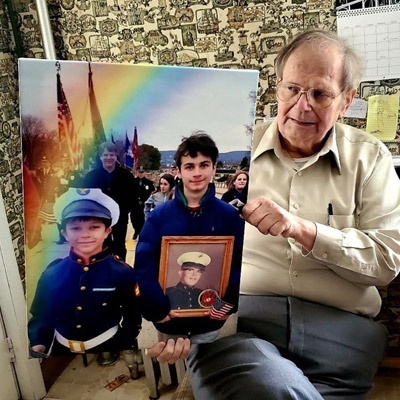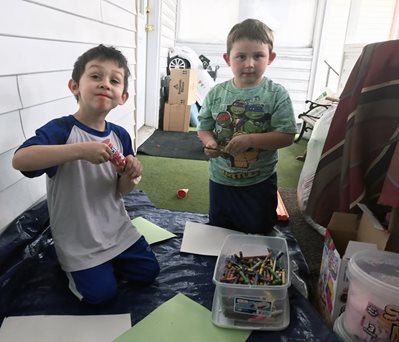The seniors living in Lackawanna County don't want to leave the homes they've known for years. NeighborWorks Northeastern Pennsylvania (NWNEPA) doesn't want them to have to leave either; that's why they formalized an Aging in Place program that began in 2018.
"We'd been assisting a lot of people with home repair and we realized that most of those people were older adults," says Mary Endrusick, Aging in Place coordinator. As the organization conducted smaller home repairs, like painting, they found many homes needed safety modifications – grab bars, railings, walk-in showers and higher toilets to name a few. Through a grant from the Weinberg Foundation, the Aging in Place program was able to provide the larger critical safety modifications along with the volunteer small home repairs. Each summer, NWNEPA partners with Group Mission Trips to bring volunteers in from across the East Coast to assist older adults with repairs around their homes.
 After the teens left, Endrusick says, her organization started getting extra calls. In one home, a tension rod needed replacing a number of times, and staff began to suspect that the resident just wanted company.
After the teens left, Endrusick says, her organization started getting extra calls. In one home, a tension rod needed replacing a number of times, and staff began to suspect that the resident just wanted company.
"Older adults do need social isolation prevention," Endrusick says. So her organization decided to take care of that, too. They began a new program called the Friendly Visitors program and paired up residents with volunteers from the community. They kicked off the program in January. By February, seniors were being warned about COVID-19 and the program screeched to an unceremonious halt.
"We knew during this time of social distancing that our older adults would be the most vulnerable and would have the most need," Endrusick says. "So we revamped the Friendly Visitor program." They made another quick pivot, asking volunteers to do Care Calls, something NeighborWorks organizations like Foundation Communities in Texas and Better Family Housing in Missouri have also been doing to check in on residents.
Matthew Baas and his wife, Anne, who volunteered for the visitors program through the Ignatian Volunteer Corps, had been paired with an older gentleman. They had exactly one visit before the program ended and they switched to Care Calls.
Baas says he's made 30 calls so far. "I've been calling to see how they are doing, how they are handling life in the middle of this pandemic. I ask if they have enough food, and if they are able to shop or have someone shop for them. I also ask the about getting their medications filled and if they are having problems meeting obligations such as utility bills or real estate taxes. Additionally, I try to find out if they live alone, and if so, do they have a relative or neighbor checking on them and how frequently. I try to let them know that we are here to help and that we will be checking in on them regularly. A lot of them are lonely and they're more than happy to get someone on the phone."
It's making a difference. And Baas, who doesn't expect to leave his home anytime soon, due to an underlying lung issue, says he's enjoying the company, too. "Talking to people is great," he says. "It's very rewarding and quite an eye-opener to hear people's stories."
Endrusick says social isolation makes her work a challenge ― and even more important. "We keep seeing media posts and advertisements: ‘We're all in this together,'" she says. "But older adults experience more isolation than the rest of us for many different reasons. They were isolated prior to this situation happening and now are even more isolated."
 To foster more connections, NeighborWorks Northeastern Pennsylvania began a KindnessWorks Challenge, encouraging the community to reach out to senior residents in unique ways and post about it on social media. To give the campaign more attention, they offered prizes.
To foster more connections, NeighborWorks Northeastern Pennsylvania began a KindnessWorks Challenge, encouraging the community to reach out to senior residents in unique ways and post about it on social media. To give the campaign more attention, they offered prizes.
"Senior isolation is a struggle we face as a community in northeastern Pennsylvania," Jesse Ergot, president and CEO, explains on the NWNEPA web site. "The challenge asks participants to be creative in spreading smiles and showing kindness while practicing safe social distancing."
The first submission came from Elizabeth Luchansky, whose children decorated their grandmother's window with cards and signs. "We communicate through the front window," she says. "We leave my dad presents on the doorknob."
Luchansky says her family has also left gifts and meals for essential workers in their neighborhood, including grocery workers, nurses and doctors. "We're trying to make this easier," she says.
Luchansky lives only five minutes away from her parents. "In a situation like this, it's still not close enough," she says.
Another way to keep connected? Signals. Shirley Russell, who retired early from her nursing job because she's disabled, says one of the volunteers who called her explained the signal system adopted by the Agency on Aging and the United Way.
A green piece of paper in the window means everything is okay. Yellow means that you need something – medicine or food, for example. It's a way that neighbors can check on each other while maintaining a distance.
She's lived in her home in Scranton, Pennsylvania, for 20 years and had no intention of moving, even when she had to retire early from a nursing job. A couple of years ago, NeighborWorks Northeastern Pennsylvania painted her house. For the past few weeks, she's heard from volunteers and staff who have called to check in "They call and make sure I don't need anything," Russell says. "It's nice to have someone call and check."
Endrusick says the calling and kindness programs seem to be working. "When this whole thing happened, my immediate thought was ‘Oh no.' This is all face to face and everything we'd designed is to make sure there's interaction with older adults. But I think it's going well."
Keeping older adults connected is important to both their mental health and their physical health, Endrusick says. "We are here to assist older adults in staying home for as long as they want to. We don't want them to have to move out of a home because the home can't support them."
05/15/2020

